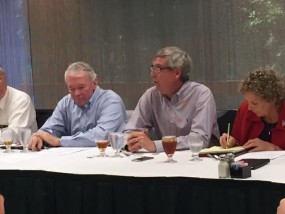
Just a couple weeks after passing the largest tax hike in Kansas’ history, the state legislature still has some work to do, County Counselor Clancy Holeman told Riley County commissioners Monday morning.
A late add-on to the budget bill puts property tax lids on county and city governments, and requires them to hold elections on the question in November if property tax increases exceed the rate of inflation.
This provision could go into effect July 1, but lawmakers are expected to at least adjust that to the 2018 budget year instead.
The problem, though, is that counties and cities do not complete their property valuations until mid-summer and use those numbers to craft budgets that must be approved in August.
Logistically speaking, it’s a no-win task, according to county clerk Rich Vargo.
“We have to have federal service ballets out 45 days prior to any election,” he said. “So working back from Aug. 25 when (the county’s budget) has to be proposed, I mean, it’s impossible.”
Holeman told commissioners to be vocal with the legislatures before they finalize the state budget on Friday.
“I would recommend you do two things,” Holeman said. “Don’t just tell them they need to show up Friday. I’m serious. I would suggest you ask them, ‘Are you going to support the clean-up of this.'”
City and county governments across the state have expressed their disdain for the late add-on and Holeman said finger-pointing in Topeka has began because of it.
“The revisor’s office is going to be pushed under the bus here a little bit, to the extent it provides cover for some legislators,” he said. “You only get so far by saying, ‘Well, you should of read it, you should know what was in it,’ because their response is going to be, ‘We were told by the revisor’s office that this is the impact of this bill.”
Commissioner Robert Boyd, who has not been shy about his ill feelings towards Topeka leadership, said he wants more citizen activism.
“We have got to get our public involved and making their feelings known on how the legislature conducts themselves,” he said.
Later, during the monthly intergovernmental luncheon at the Holiday Inn at the Campus, State Representative Tom Phillips said the House had done its part to make the provision easy to work with.
“The House did try to clean it up the best we could, in terms that new infrastructure has been exempted (from elections) bonds and interest payments (have been exempted),” he said. “So it’s a much better attempt to clean up the language than what the Senate passed.”
Still, he understands that’s meant little to calm the rough waters that exist between local leaders and Topeka.
“You saw the frustration here by our local officials, and I understand that,” he said.
Ron Highland, a Republican State Representative of Wabaunsee County, voted for the final budget that is supposed to bridge the nearly $400 million budget gap the state was facing and raises sales tax across the board.
Highland was questioned and criticized about his vote during the luncheon, but told KMAN following the meeting, hopefully the Sine Die Friday will help to put off the property tax cap until 2018.
“The concerns about our state revenues — that’s not going to be easily solved,” he said. “That’s going to be a difficult one because of the national economy and the Kansas economy and our declining population.
“Where do the two cross?”
Manhattan Mayor Karen McCulloh said there is a disconnect between local and state policy makers.
“I think there’s no doubt there’s frustration and anger because we’ve been treated at the local level very badly,” she said after the luncheon. “The state is in bad shape because they wiped out taxes for basically the affluent.
“The real thing that’s a problem is that this is all happening to us just as we’re trying to do our budget. They knew in January how far in the hole they were. They should have dealt with that in January.”
